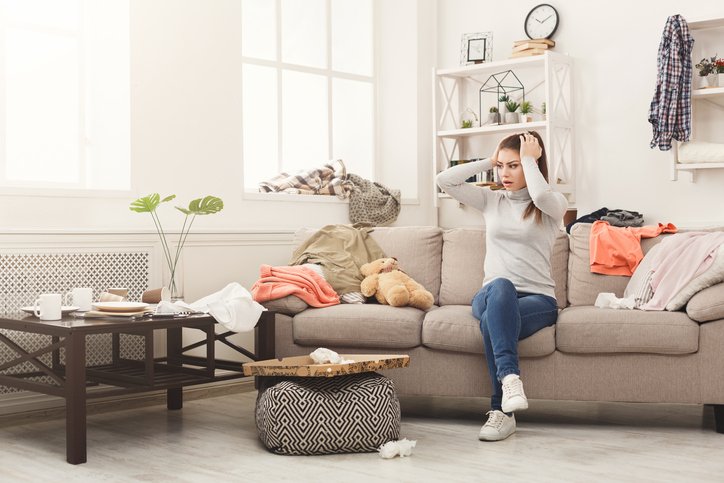
By Sandi Schwartz | Contributor
How often have you found yourself shouting at your children to tidy up their spaces? Surprisingly, that clutter not only frustrates you but also adds stress to the entire family, as research indicates that clutter is associated with heightened stress and anxiety levels. A study conducted by UCLA’s Center on Everyday Lives and Families (CELF) found that the stress experienced by family members correlates directly with the amount of possessions they have. What causes this connection, and how can we address it?
Why Clutter Causes Stress
It is evident that the persistent sight of accumulating clutter—be it papers, toys, random photos, laundry, or gadgets—can significantly affect our mental well-being. The reasons behind this are more intricate than one might assume. A disorganized environment can lead to feelings of anxiety, helplessness, overwhelming emotions, embarrassment, shame, and guilt. Many individuals may not even realize that the clutter is the primary source of their stress, particularly if it has been a part of their daily environment for an extended period.
Feeling anxious about clutter can lead to additional stress-related challenges in our lives, such as troubles with sleep and conflicts in relationships stemming from disagreements with family about the mess.
Clutter contributes to our stress for several reasons:
- It overstimulates our minds and overloads our senses.
- It distracts us.
- It constantly reminds our brains of pending tasks.
- It makes it difficult to relax, both physically and mentally.
- It induces feelings of guilt and embarrassment when guests see our disorganized spaces, leading us to worry about negative judgments.
- It frustrates our efforts to find necessary items. Research from the American Demographic Society reveals that Americans lose 9 million hours each day searching for misplaced possessions, and 23% of adults report late bill payments due to lost statements.
- It hampers creativity and productivity since our brains struggle to focus amidst the clutter. A study by the Princeton University Neuroscience Institute showed that environments filled with physical disarray significantly reduce productivity and increase distractions.
Anxiety surrounding clutter can result in other stress-related complications, such as sleep disturbances and relationship issues due to frequent arguments over messiness. Additionally, if clutter leads to misplaced items, it can disrupt timely school drop-offs, affect job performance, and delay payments on bills.
According to UCLA’s CELF research, many American families find themselves overwhelmed by clutter. During the study, researchers visited the homes of 32 families across the country and discovered that living in a disorganized space creates a persistent sense of stress that negatively impacts mood and self-esteem. They also found that women, particularly mothers in these households, experienced higher stress levels related to clutter, with elevated stress hormones noted while they attempted to organize their possessions.
Why Reducing Clutter Helps
The accumulation of items in closets, drawers, and on countertops generates negative energy throughout your living space. These piles symbolize chaos and confusion, which can contribute to stress.
When we clean up the mess, our overall stress levels begin to decrease, and we start to feel more positive energy, aiding in a happier and healthier life.
Joyce Marter, a Licensed Clinical Professional Counselor and Founder of Urban Balance, states, “Our environment is a direct reflection of our internal mental health and vice versa. If our home is disorganized, our minds may feel scattered too. Home organization fosters serenity and well-being.” She recommends eliminating unnecessary items to live more effectively. With less clutter, we can save time and reduce overall stress.
Professional organizer Angela Betancourt has witnessed the mental health benefits clients experience when they declutter their homes. Clients usually report lower stress and anxiety, increased inner peace, heightened self-confidence, and improved health habits, such as better sleep quality. Essentially, a clutter-free space allows for clearer thinking, more effective task completion, and calmer rest.
Moreover, decluttering can enhance our confidence when entertaining guests at home. We no longer live in fear of judgment for our mess, alleviating feelings of anxiety, embarrassment, and conflicts in relationships.
How To Get Organized
Starting to declutter may seem daunting and intimidating, especially the more you have accumulated. It can evoke feelings of stress at the mere thought of parting with belongings, as it might conjure a sense of loss or nostalgia. It’s crucial to overcome that emotional barrier to begin sorting and discarding items that no longer benefit your family. Remind yourself that the process will ultimately lead to reduced stress!
Your aim is to simplify your environment by getting rid of unnecessary items and organizing the spaces that tend to get cluttered and disorderly. An abundance of resources, including websites, articles, books, professional organizers, and stores, offer excellent strategies to help you declutter. Identify what works best for your family, but try not to become overwhelmed by the myriad of options available.
Here are some organizing tips to help you get started:
Make it a family activity. There’s no need to face the clutter alone. Involve the entire family and make it enjoyable. Play some music and order pizza. Consider initiating a friendly competition to see who can organize their room best or gather the most items for charity. Your children will benefit from acquiring organizational skills and experience a sense of accomplishment.
Set a schedule. By adding decluttering to your routine, you can avoid allowing it to accumulate. Establish a routine, such as the first Sunday of every month or before specific holidays. The end of summer before school begins and during spring break are excellent times to purge.
Stop clutter at the door. After attending a party or event with goody bags, dispose of items you do not want or need immediately. This is also an effective strategy for managing mail; recycle unwanted pieces before they clutter your workspace.
Return everything to its place. Simplify cleanup by returning items to their designated spots immediately after use.
Invest in organizational tools. Keep it simple: file folders for important documents, a To Do basket for urgent tasks, bins or containers for loose photos and children’s artwork, storage bins for seasonal clothing, and so on.
Lastly, follow this popular sorting method suggested by most experts:
- Keep. These items are essential to you, regularly used, and bring you joy.
- Sell. Try selling items online through platforms like Craigslist or eBay, or consider hosting a yard sale.
- Donate. Your unused items might be valuable to someone else. Donate them to individuals in need or local charities.
- Trash. Discard items that are damaged beyond repair or not useful anymore. Recycle where possible.
- Store. If you struggle with a decision, box the items up, label them with a date, and revisit them in six months. Store them in an attic, extra closet, garage, or offsite storage facility to keep them out of main living spaces.
For more tips, check out our article on GoodLifeFamilyMag.com titled Clearing the Clutter.








